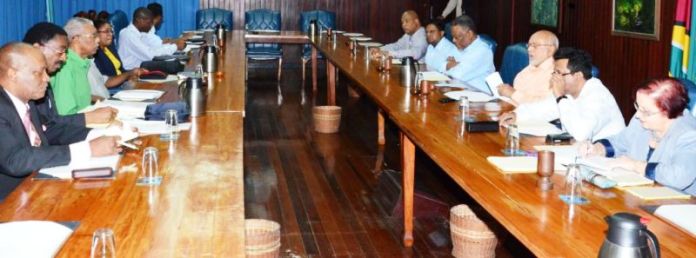By Fareeza Haniff

[www.inewsguyana.com] – The meeting between President Donald Ramotar and the opposition political parties on Wednesday morning (February 26) was unproductive as both sides failed to reach a compromise as it relates to the passage of the Anti – Money Laundering and Countering the Financing of Terrorism (Amendment) Bill (AML&CFT).
However, there is still some lifeline left as the Special Select Committee which is reviewing the Bill will meet later today to further discuss the contentious Amendments. Talks broke down during the meeting, as both the government and Opposition refused to budge on their position.
Leader of the Alliance for Change (AFC), Khemraj Ramjattan told reporters outside Office of the President that both sides want their demands met; the AFC wants the Public Procurement Commission established, while A Partnership for National Unity (APNU) wants the President to assent to certain Bills and to agree to the proposed Amendments to the AML&CFT Bill.
The government on the other hand wants the Opposition to support the Bill in its current form when it is presented in the National Assembly, without fulfilling any of the Opposition’s demands.

AFC Member, Cathy Hughes said that she was not too pleased with the tone which the meeting started.
“The President more or less started off saying that you know there is not much that we can seem to agree on and to me that kind of set the wrong tone,” Hughes told reporters.
Additionally, Leader of the APNU David Granger made it abundantly clear that his Party will not support the AML Bill if the Amendments are not inserted. This position, he said was made known to President Ramotar during the meeting.
“The APNU position is that we still want a Bill that is enforceable and we insist on having our Amendments inserted in the Bill. We also made it clear that certain governance issues ought to be attended to and we insisted that the four Bills which were sent back to the Speaker of the House be assented to,” Granger said.
He noted that President Donald Ramotar is bent on having the AML Bill approved by the National Assembly without any Amendments.
“We don’t agree with that. It has to be amended if it is to be given the enforcement mechanism that we expect. We cannot approve a Bill that is not enforceable,” Granger reiterated.
APNU Executive Member, Carl Greenidge explained that they discussed the PPC, but then talks broke down when the topic of Fiscal Management and Accountability Act came up.
“When we came to discuss the Local Government Bills which were not assented to, Payment of Emoluments to a Former President, when we came to try and correct the constitutional infringements that the Fiscal Management and Accountability Act has, the whole discussion broke down. The President was of the view that none of these things could be changed; they had a problem of anything. The meeting in a sense became derailed,” Greenidge said.
The APNU has proposed three major amendments to the Principal Act of the Bill, which includes giving the Police the power to seize cash in excess of $2M and to arrest the person if there is cause to believe that the cash was obtained illegally. Guyana has to submit a report to the Caribbean Financial Action Task Force (CFATF} on its follow-up process by February 28.
This means that the Bill has to be passed, enforced and submitted along with the report by that date to the CFATF. This body then has to analyse the Bill on aspects of compliance with international standards subsequent to which a report will be made to the plenary in May.
On the basis of that report, the plenary will be able to make a decision on the way forward. It will decide whether Guyana should be subjected to further counter measures or if it should be recommended to the FATF for review by the International Co-operation Review Group (ICRG).























